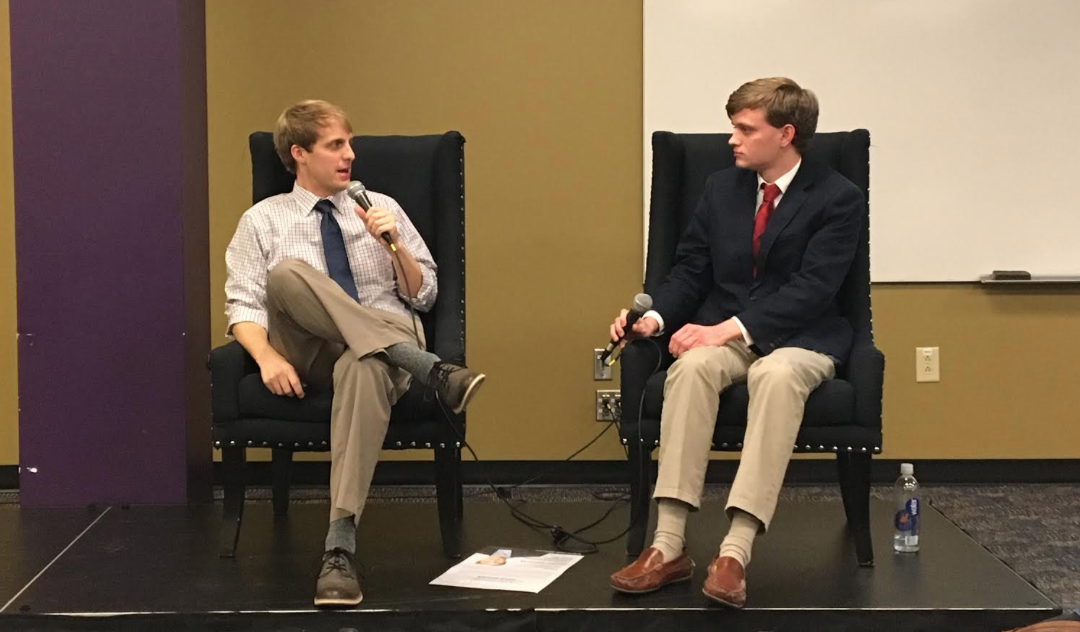The Tennessean’s Vanderbilt beat reporter Adam Sparks came to campus to speak to Lipscomb students about the importance of being flexible and honest in their careers.
Lipscomb hosted its first Media Masters of the semester on Tuesday evening, with sophomore journalism major Spencer Boehme interviewing Sparks during the evening.
Sparks, a graduate of MTSU, has been a sports writer for 19 years. He has won numerous journalism awards, including National Beat Writer of the Year.
Throughout his writing career, he has covered a variety of stories, from reporting on the Titans and the Nashville Sounds to flag football and elementary basketball. Sparks encouraged Lipscomb students to be open to a variety of job opportunities, paid or unpaid.
“If you are given an opportunity to work, you say ‘Yes,’” said Sparks, noting that unpaid or low-pay opportunities should not necessarily be looked down upon.
“You have to get your foot in the door, [in] some way or some fashion,” Sparks said.
Sparks gave an example from his own life, explaining that he often accepted reporting opportunities that were generally looked down upon, an attitude and choice which Sparks said he believes gains reporters respect.
He also discussed the importance of work flexibility to non-journalism careers, sharing a story of his friend who wanted to be a loan officer but finally accepted a job as a bank teller, due to his lack of experience, and was later promoted to vice president.
“The reason he got there is he finally said, ‘I’ll take whatever bottom position you’re offering me,’” Sparks said.
In addition to his career as a professional reporter, Sparks is also a self-professed Christian and a Sunday School teacher. Throughout the evening, Sparks shared several Bible passages to encourage students about the importance of faith in their lives and careers.
One of the Scripture references was James 1, which warns readers to respond slowly and thoughtfully to situations. Sparks interpreted the passage to be a reminder of how cautious reporters need to be when tweeting or posting on social media.
“You can lose your job over one bad tweet,” Sparks said. “Take 10 seconds before you tweet something.”
In addition, Sparks quoted a passage from 2 Peter in an effort to help students understand how their faith can co-exist with their professional life.
“Everything that comes into you should go through the filter of Scripture,” Sparks said. “Everything that you put out in your career should go through the filter of Scripture.”
One of Boehme’s questions for Sparks was what his typical schedule looks like. Sparks responded by explaining how his role as a journalist uses more skills than just his writing ability, particularly during football season’s Tuesday press conferences.
In addition to asking questions at press conferences, Sparks said he also will video it on his iPhone and record it for audio, both of which he ends up editing and posting about significantly before “ever typing a word.”
Sparks also focused on the importance of maintaining multiple skills as a professional.
“Be good at one thing, and be good enough at everything,” Sparks said, adding, “because you will be asked to do everything.”
Another piece of advice Sparks shared was for journalists to always be 100% honest. At one point in Sparks’ reporting career, he was reprimanded for being “too honest.” Still, Sparks encouraged students to tell the truth no matter the result.
“The best advice I can give is be completely honest with them [the interviewees],” Sparks said, “and understand that you may not get the best story that you would get if you lied to them.”
Ultimately, Sparks advised students to be unbiased journalists by listening to the vantage points of a variety of sources.
“Get a wide perspective and talk to an enormous amount of people,” Sparks said, “because, the smaller your group is that you talk to, the less you will understand.”

